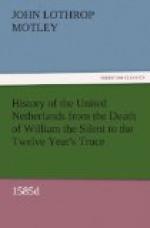It may easily be supposed that Philip was pleased with the triumphs that had thus been achieved. He was even grateful, or affected to be grateful, to him who had achieved them. He awarded great praise to Alexander for his exertions, on the memorable occasions of the attack upon the bridge, and the battle of the Kowenstyn; but censured him affectionately for so rashly exposing his life. “I have no words,” he said, “to render the thanks which are merited for all that you have been doing. I recommend you earnestly however to have a care for the security of your person, for that is of more consequence than all the rest.”
After the news of the reduction of the city, he again expressed gratification, but in rather cold language. “From such obstinate people,” said he, “not more could be extracted than has been extracted; therefore the capitulation is satisfactory.” What more he wished to extract it would be difficult to say, for certainly the marrow had been extracted from the bones, and the dead city was thenceforth left to moulder under the blight of a foreign garrison and an army of Jesuits. “Perhaps religious affairs will improve before long,” said Philip. They did improve very soon, as he understood the meaning of improvement. A solitude of religion soon brought with it a solitude in every other regard, and Antwerp became a desert, as Sainte Aldegonde had foretold would be the case.
The King had been by no means so calm, however, when the intelligence of the capitulation first reached him at Madrid. On the contrary, his oldest courtiers had never seen him exhibit such marks of hilarity.




